Report on Entrepreneurship: Ventures, Economics, and Impact Analysis
VerifiedAdded on 2020/01/07
|18
|4960
|40
Report
AI Summary
This report provides a comprehensive overview of entrepreneurship, examining various types of entrepreneurial ventures, including small, scalable, large, social, serial, and female entrepreneurship. It delves into the similarities and differences between small and large entrepreneurial ventures, analyzing aspects such as control, profit, market share, customer base, funding, goodwill, employees, location, and extra costs. The report further explores the impact of micro and small businesses on the economy, highlighting their role in creating opportunities, reducing poverty, and eliminating unemployment. It also contrasts these with medium and large businesses, outlining their nature and characteristics, including private businesses, sole proprietorships, and partnerships. The analysis emphasizes how small businesses contribute to economic improvement by providing employment opportunities and fostering economic growth.

Entrepreneurship
Paraphrase This Document
Need a fresh take? Get an instant paraphrase of this document with our AI Paraphraser
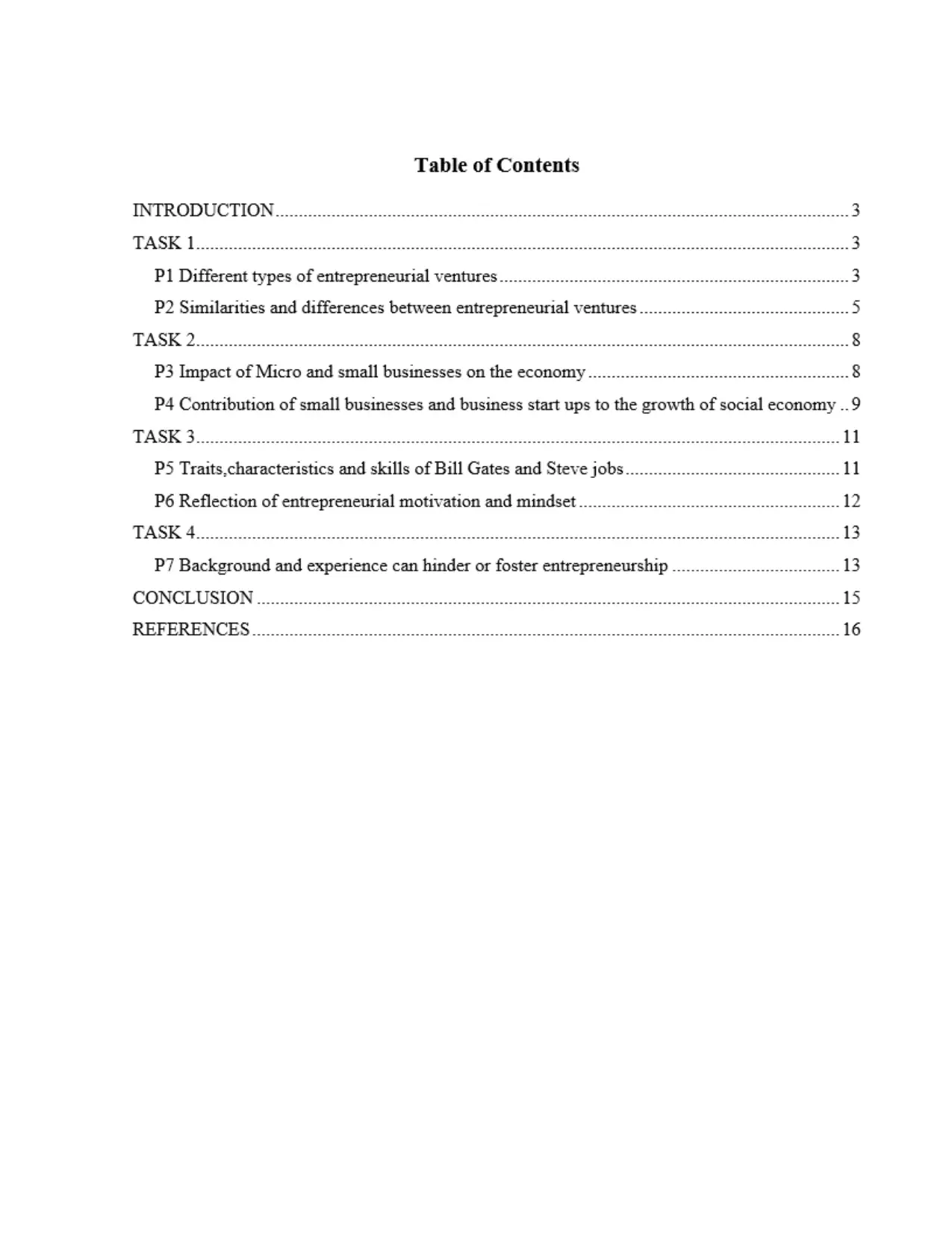
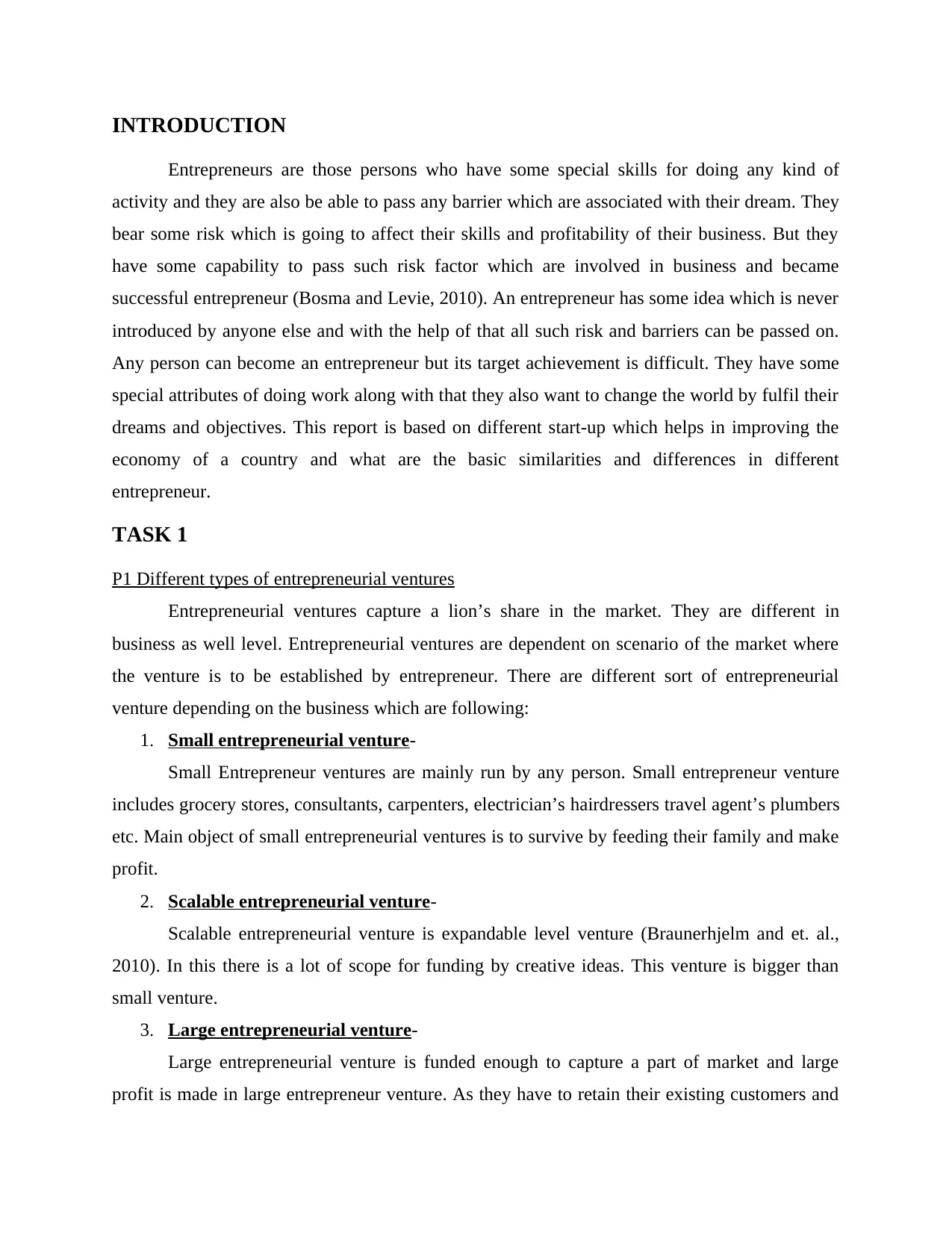
INTRODUCTION
Entrepreneurs are those persons who have some special skills for doing any kind of
activity and they are also be able to pass any barrier which are associated with their dream. They
bear some risk which is going to affect their skills and profitability of their business. But they
have some capability to pass such risk factor which are involved in business and became
successful entrepreneur (Bosma and Levie, 2010). An entrepreneur has some idea which is never
introduced by anyone else and with the help of that all such risk and barriers can be passed on.
Any person can become an entrepreneur but its target achievement is difficult. They have some
special attributes of doing work along with that they also want to change the world by fulfil their
dreams and objectives. This report is based on different start-up which helps in improving the
economy of a country and what are the basic similarities and differences in different
entrepreneur.
TASK 1
P1 Different types of entrepreneurial ventures
Entrepreneurial ventures capture a lion’s share in the market. They are different in
business as well level. Entrepreneurial ventures are dependent on scenario of the market where
the venture is to be established by entrepreneur. There are different sort of entrepreneurial
venture depending on the business which are following:
1. Small entrepreneurial venture-
Small Entrepreneur ventures are mainly run by any person. Small entrepreneur venture
includes grocery stores, consultants, carpenters, electrician’s hairdressers travel agent’s plumbers
etc. Main object of small entrepreneurial ventures is to survive by feeding their family and make
profit.
2. Scalable entrepreneurial venture-
Scalable entrepreneurial venture is expandable level venture (Braunerhjelm and et. al.,
2010). In this there is a lot of scope for funding by creative ideas. This venture is bigger than
small venture.
3. Large entrepreneurial venture-
Large entrepreneurial venture is funded enough to capture a part of market and large
profit is made in large entrepreneur venture. As they have to retain their existing customers and
Entrepreneurs are those persons who have some special skills for doing any kind of
activity and they are also be able to pass any barrier which are associated with their dream. They
bear some risk which is going to affect their skills and profitability of their business. But they
have some capability to pass such risk factor which are involved in business and became
successful entrepreneur (Bosma and Levie, 2010). An entrepreneur has some idea which is never
introduced by anyone else and with the help of that all such risk and barriers can be passed on.
Any person can become an entrepreneur but its target achievement is difficult. They have some
special attributes of doing work along with that they also want to change the world by fulfil their
dreams and objectives. This report is based on different start-up which helps in improving the
economy of a country and what are the basic similarities and differences in different
entrepreneur.
TASK 1
P1 Different types of entrepreneurial ventures
Entrepreneurial ventures capture a lion’s share in the market. They are different in
business as well level. Entrepreneurial ventures are dependent on scenario of the market where
the venture is to be established by entrepreneur. There are different sort of entrepreneurial
venture depending on the business which are following:
1. Small entrepreneurial venture-
Small Entrepreneur ventures are mainly run by any person. Small entrepreneur venture
includes grocery stores, consultants, carpenters, electrician’s hairdressers travel agent’s plumbers
etc. Main object of small entrepreneurial ventures is to survive by feeding their family and make
profit.
2. Scalable entrepreneurial venture-
Scalable entrepreneurial venture is expandable level venture (Braunerhjelm and et. al.,
2010). In this there is a lot of scope for funding by creative ideas. This venture is bigger than
small venture.
3. Large entrepreneurial venture-
Large entrepreneurial venture is funded enough to capture a part of market and large
profit is made in large entrepreneur venture. As they have to retain their existing customers and
⊘ This is a preview!⊘
Do you want full access?
Subscribe today to unlock all pages.

Trusted by 1+ million students worldwide
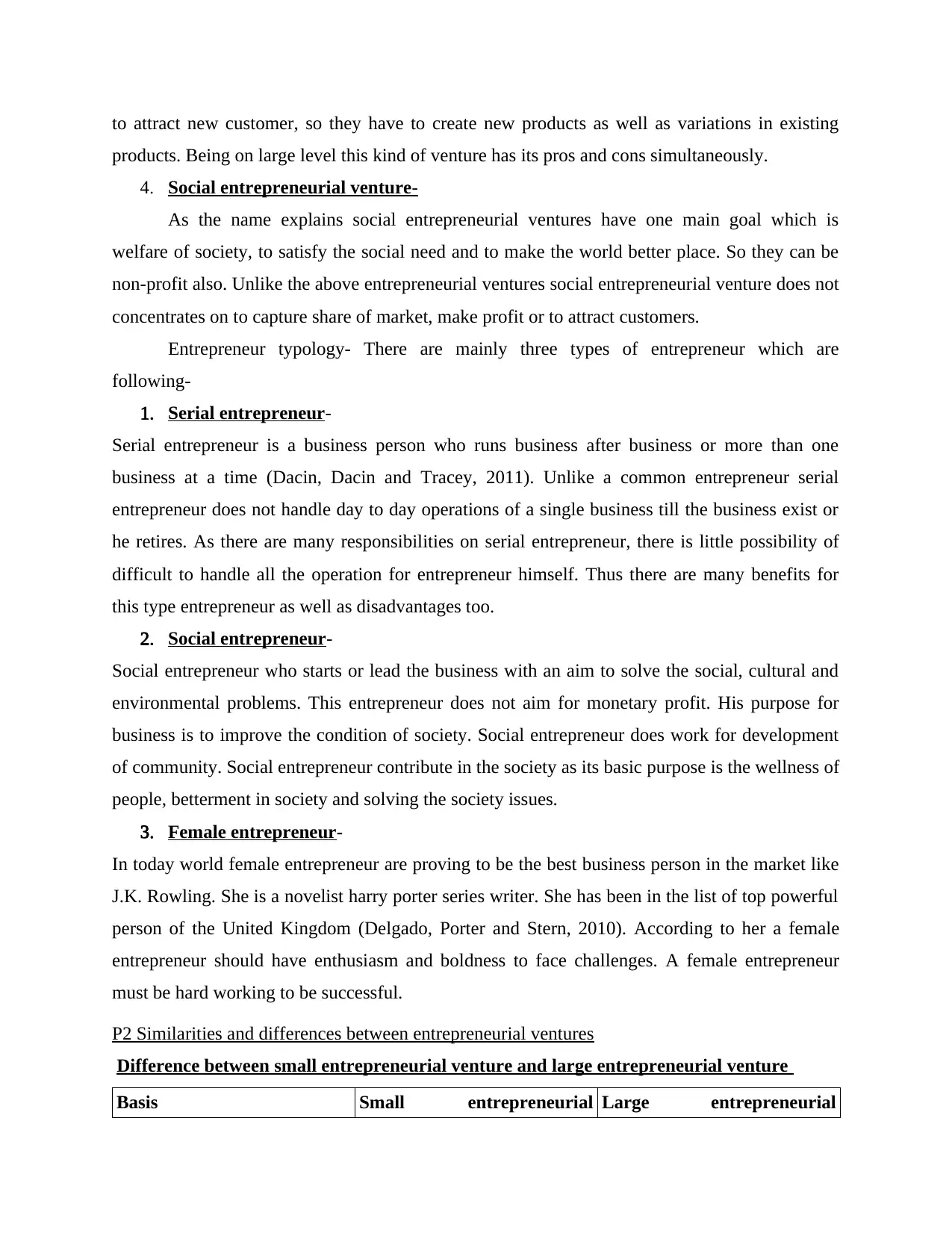
to attract new customer, so they have to create new products as well as variations in existing
products. Being on large level this kind of venture has its pros and cons simultaneously.
4. Social entrepreneurial venture-
As the name explains social entrepreneurial ventures have one main goal which is
welfare of society, to satisfy the social need and to make the world better place. So they can be
non-profit also. Unlike the above entrepreneurial ventures social entrepreneurial venture does not
concentrates on to capture share of market, make profit or to attract customers.
Entrepreneur typology- There are mainly three types of entrepreneur which are
following-
1. Serial entrepreneur-
Serial entrepreneur is a business person who runs business after business or more than one
business at a time (Dacin, Dacin and Tracey, 2011). Unlike a common entrepreneur serial
entrepreneur does not handle day to day operations of a single business till the business exist or
he retires. As there are many responsibilities on serial entrepreneur, there is little possibility of
difficult to handle all the operation for entrepreneur himself. Thus there are many benefits for
this type entrepreneur as well as disadvantages too.
2. Social entrepreneur-
Social entrepreneur who starts or lead the business with an aim to solve the social, cultural and
environmental problems. This entrepreneur does not aim for monetary profit. His purpose for
business is to improve the condition of society. Social entrepreneur does work for development
of community. Social entrepreneur contribute in the society as its basic purpose is the wellness of
people, betterment in society and solving the society issues.
3. Female entrepreneur-
In today world female entrepreneur are proving to be the best business person in the market like
J.K. Rowling. She is a novelist harry porter series writer. She has been in the list of top powerful
person of the United Kingdom (Delgado, Porter and Stern, 2010). According to her a female
entrepreneur should have enthusiasm and boldness to face challenges. A female entrepreneur
must be hard working to be successful.
P2 Similarities and differences between entrepreneurial ventures
Difference between small entrepreneurial venture and large entrepreneurial venture
Basis Small entrepreneurial Large entrepreneurial
products. Being on large level this kind of venture has its pros and cons simultaneously.
4. Social entrepreneurial venture-
As the name explains social entrepreneurial ventures have one main goal which is
welfare of society, to satisfy the social need and to make the world better place. So they can be
non-profit also. Unlike the above entrepreneurial ventures social entrepreneurial venture does not
concentrates on to capture share of market, make profit or to attract customers.
Entrepreneur typology- There are mainly three types of entrepreneur which are
following-
1. Serial entrepreneur-
Serial entrepreneur is a business person who runs business after business or more than one
business at a time (Dacin, Dacin and Tracey, 2011). Unlike a common entrepreneur serial
entrepreneur does not handle day to day operations of a single business till the business exist or
he retires. As there are many responsibilities on serial entrepreneur, there is little possibility of
difficult to handle all the operation for entrepreneur himself. Thus there are many benefits for
this type entrepreneur as well as disadvantages too.
2. Social entrepreneur-
Social entrepreneur who starts or lead the business with an aim to solve the social, cultural and
environmental problems. This entrepreneur does not aim for monetary profit. His purpose for
business is to improve the condition of society. Social entrepreneur does work for development
of community. Social entrepreneur contribute in the society as its basic purpose is the wellness of
people, betterment in society and solving the society issues.
3. Female entrepreneur-
In today world female entrepreneur are proving to be the best business person in the market like
J.K. Rowling. She is a novelist harry porter series writer. She has been in the list of top powerful
person of the United Kingdom (Delgado, Porter and Stern, 2010). According to her a female
entrepreneur should have enthusiasm and boldness to face challenges. A female entrepreneur
must be hard working to be successful.
P2 Similarities and differences between entrepreneurial ventures
Difference between small entrepreneurial venture and large entrepreneurial venture
Basis Small entrepreneurial Large entrepreneurial
Paraphrase This Document
Need a fresh take? Get an instant paraphrase of this document with our AI Paraphraser
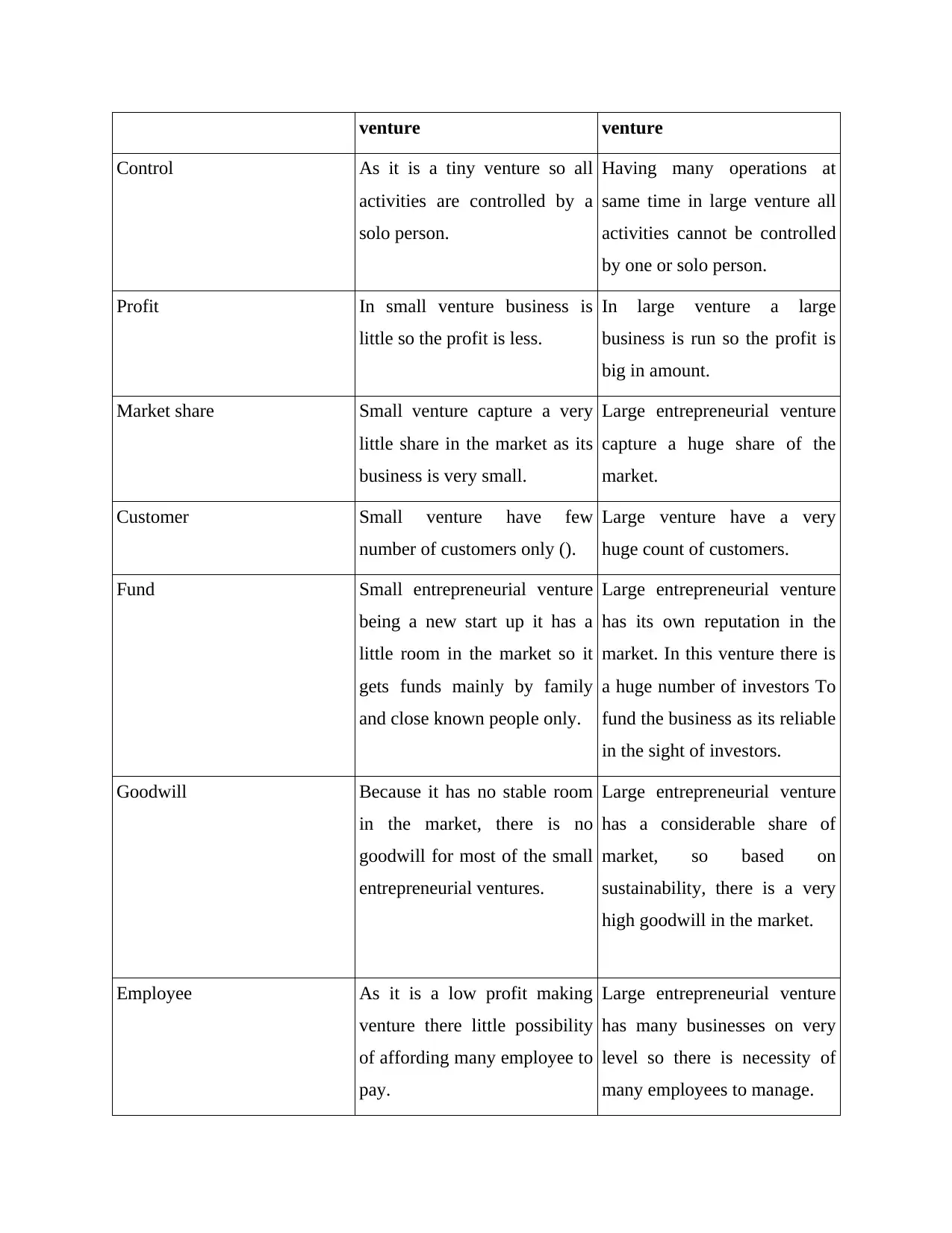
venture venture
Control As it is a tiny venture so all
activities are controlled by a
solo person.
Having many operations at
same time in large venture all
activities cannot be controlled
by one or solo person.
Profit In small venture business is
little so the profit is less.
In large venture a large
business is run so the profit is
big in amount.
Market share Small venture capture a very
little share in the market as its
business is very small.
Large entrepreneurial venture
capture a huge share of the
market.
Customer Small venture have few
number of customers only ().
Large venture have a very
huge count of customers.
Fund Small entrepreneurial venture
being a new start up it has a
little room in the market so it
gets funds mainly by family
and close known people only.
Large entrepreneurial venture
has its own reputation in the
market. In this venture there is
a huge number of investors To
fund the business as its reliable
in the sight of investors.
Goodwill Because it has no stable room
in the market, there is no
goodwill for most of the small
entrepreneurial ventures.
Large entrepreneurial venture
has a considerable share of
market, so based on
sustainability, there is a very
high goodwill in the market.
Employee As it is a low profit making
venture there little possibility
of affording many employee to
pay.
Large entrepreneurial venture
has many businesses on very
level so there is necessity of
many employees to manage.
Control As it is a tiny venture so all
activities are controlled by a
solo person.
Having many operations at
same time in large venture all
activities cannot be controlled
by one or solo person.
Profit In small venture business is
little so the profit is less.
In large venture a large
business is run so the profit is
big in amount.
Market share Small venture capture a very
little share in the market as its
business is very small.
Large entrepreneurial venture
capture a huge share of the
market.
Customer Small venture have few
number of customers only ().
Large venture have a very
huge count of customers.
Fund Small entrepreneurial venture
being a new start up it has a
little room in the market so it
gets funds mainly by family
and close known people only.
Large entrepreneurial venture
has its own reputation in the
market. In this venture there is
a huge number of investors To
fund the business as its reliable
in the sight of investors.
Goodwill Because it has no stable room
in the market, there is no
goodwill for most of the small
entrepreneurial ventures.
Large entrepreneurial venture
has a considerable share of
market, so based on
sustainability, there is a very
high goodwill in the market.
Employee As it is a low profit making
venture there little possibility
of affording many employee to
pay.
Large entrepreneurial venture
has many businesses on very
level so there is necessity of
many employees to manage.
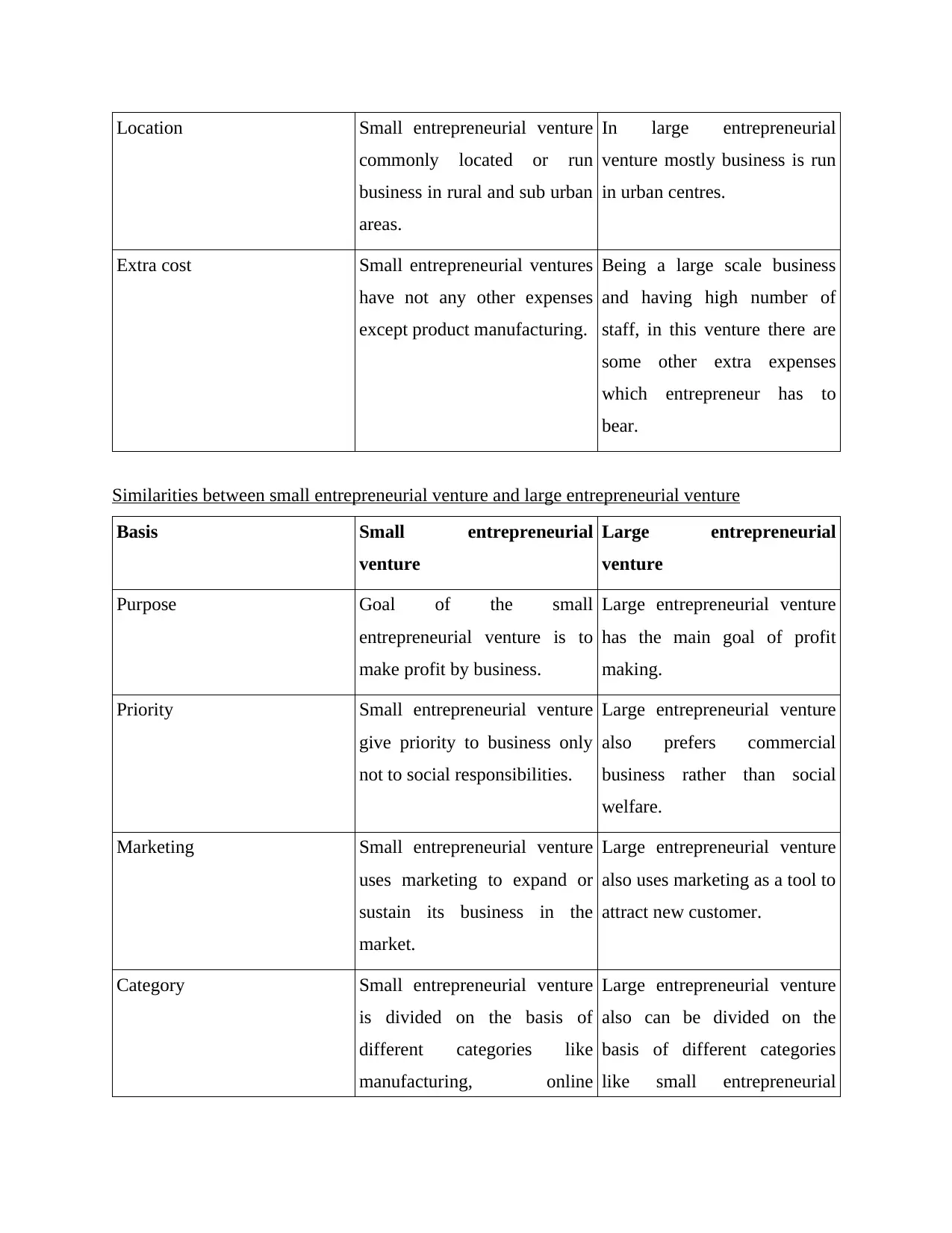
Location Small entrepreneurial venture
commonly located or run
business in rural and sub urban
areas.
In large entrepreneurial
venture mostly business is run
in urban centres.
Extra cost Small entrepreneurial ventures
have not any other expenses
except product manufacturing.
Being a large scale business
and having high number of
staff, in this venture there are
some other extra expenses
which entrepreneur has to
bear.
Similarities between small entrepreneurial venture and large entrepreneurial venture
Basis Small entrepreneurial
venture
Large entrepreneurial
venture
Purpose Goal of the small
entrepreneurial venture is to
make profit by business.
Large entrepreneurial venture
has the main goal of profit
making.
Priority Small entrepreneurial venture
give priority to business only
not to social responsibilities.
Large entrepreneurial venture
also prefers commercial
business rather than social
welfare.
Marketing Small entrepreneurial venture
uses marketing to expand or
sustain its business in the
market.
Large entrepreneurial venture
also uses marketing as a tool to
attract new customer.
Category Small entrepreneurial venture
is divided on the basis of
different categories like
manufacturing, online
Large entrepreneurial venture
also can be divided on the
basis of different categories
like small entrepreneurial
commonly located or run
business in rural and sub urban
areas.
In large entrepreneurial
venture mostly business is run
in urban centres.
Extra cost Small entrepreneurial ventures
have not any other expenses
except product manufacturing.
Being a large scale business
and having high number of
staff, in this venture there are
some other extra expenses
which entrepreneur has to
bear.
Similarities between small entrepreneurial venture and large entrepreneurial venture
Basis Small entrepreneurial
venture
Large entrepreneurial
venture
Purpose Goal of the small
entrepreneurial venture is to
make profit by business.
Large entrepreneurial venture
has the main goal of profit
making.
Priority Small entrepreneurial venture
give priority to business only
not to social responsibilities.
Large entrepreneurial venture
also prefers commercial
business rather than social
welfare.
Marketing Small entrepreneurial venture
uses marketing to expand or
sustain its business in the
market.
Large entrepreneurial venture
also uses marketing as a tool to
attract new customer.
Category Small entrepreneurial venture
is divided on the basis of
different categories like
manufacturing, online
Large entrepreneurial venture
also can be divided on the
basis of different categories
like small entrepreneurial
⊘ This is a preview!⊘
Do you want full access?
Subscribe today to unlock all pages.

Trusted by 1+ million students worldwide

marketing etc. venture as manufacturing,
online marketing etc.
online marketing etc.
Paraphrase This Document
Need a fresh take? Get an instant paraphrase of this document with our AI Paraphraser
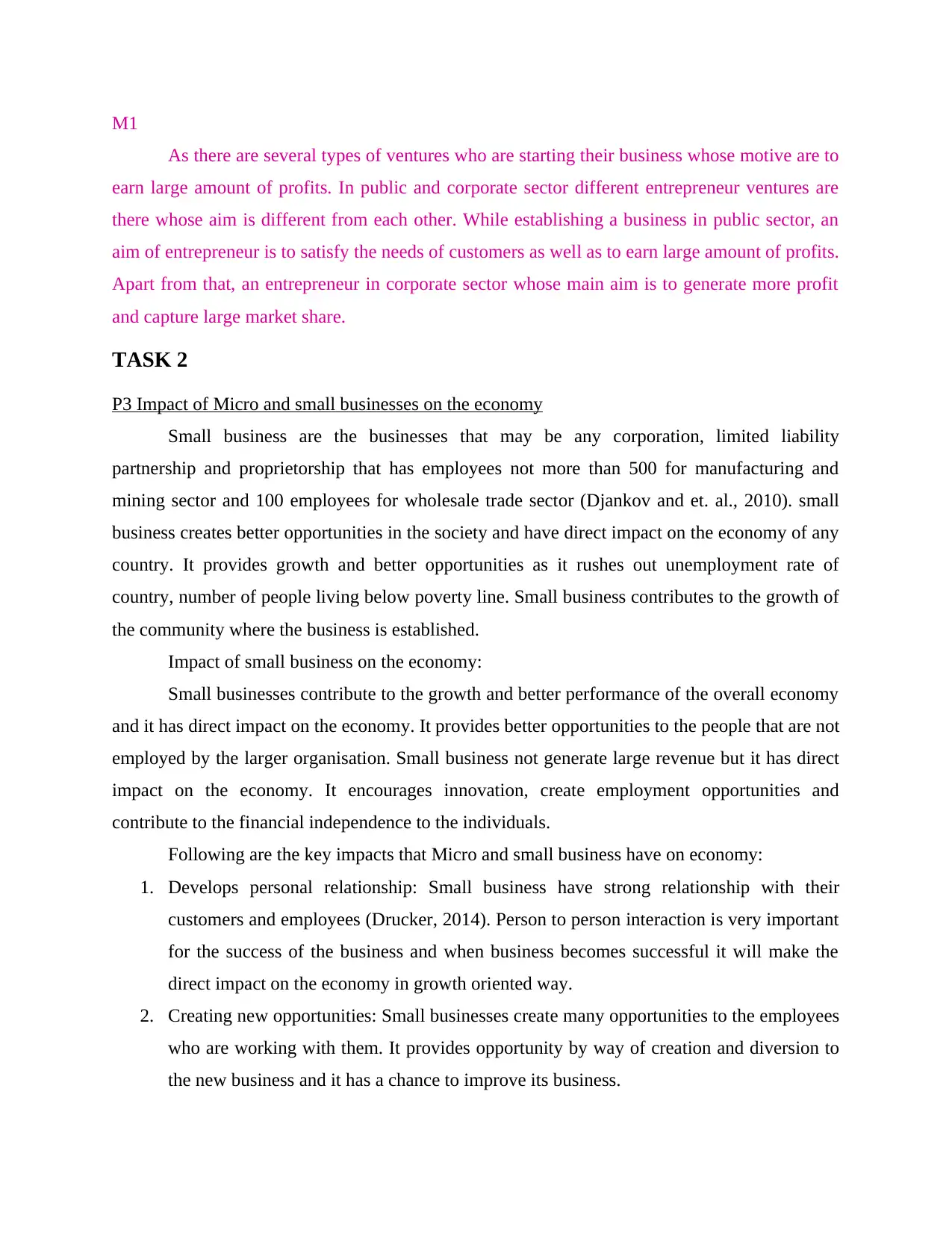
M1
As there are several types of ventures who are starting their business whose motive are to
earn large amount of profits. In public and corporate sector different entrepreneur ventures are
there whose aim is different from each other. While establishing a business in public sector, an
aim of entrepreneur is to satisfy the needs of customers as well as to earn large amount of profits.
Apart from that, an entrepreneur in corporate sector whose main aim is to generate more profit
and capture large market share.
TASK 2
P3 Impact of Micro and small businesses on the economy
Small business are the businesses that may be any corporation, limited liability
partnership and proprietorship that has employees not more than 500 for manufacturing and
mining sector and 100 employees for wholesale trade sector (Djankov and et. al., 2010). small
business creates better opportunities in the society and have direct impact on the economy of any
country. It provides growth and better opportunities as it rushes out unemployment rate of
country, number of people living below poverty line. Small business contributes to the growth of
the community where the business is established.
Impact of small business on the economy:
Small businesses contribute to the growth and better performance of the overall economy
and it has direct impact on the economy. It provides better opportunities to the people that are not
employed by the larger organisation. Small business not generate large revenue but it has direct
impact on the economy. It encourages innovation, create employment opportunities and
contribute to the financial independence to the individuals.
Following are the key impacts that Micro and small business have on economy:
1. Develops personal relationship: Small business have strong relationship with their
customers and employees (Drucker, 2014). Person to person interaction is very important
for the success of the business and when business becomes successful it will make the
direct impact on the economy in growth oriented way.
2. Creating new opportunities: Small businesses create many opportunities to the employees
who are working with them. It provides opportunity by way of creation and diversion to
the new business and it has a chance to improve its business.
As there are several types of ventures who are starting their business whose motive are to
earn large amount of profits. In public and corporate sector different entrepreneur ventures are
there whose aim is different from each other. While establishing a business in public sector, an
aim of entrepreneur is to satisfy the needs of customers as well as to earn large amount of profits.
Apart from that, an entrepreneur in corporate sector whose main aim is to generate more profit
and capture large market share.
TASK 2
P3 Impact of Micro and small businesses on the economy
Small business are the businesses that may be any corporation, limited liability
partnership and proprietorship that has employees not more than 500 for manufacturing and
mining sector and 100 employees for wholesale trade sector (Djankov and et. al., 2010). small
business creates better opportunities in the society and have direct impact on the economy of any
country. It provides growth and better opportunities as it rushes out unemployment rate of
country, number of people living below poverty line. Small business contributes to the growth of
the community where the business is established.
Impact of small business on the economy:
Small businesses contribute to the growth and better performance of the overall economy
and it has direct impact on the economy. It provides better opportunities to the people that are not
employed by the larger organisation. Small business not generate large revenue but it has direct
impact on the economy. It encourages innovation, create employment opportunities and
contribute to the financial independence to the individuals.
Following are the key impacts that Micro and small business have on economy:
1. Develops personal relationship: Small business have strong relationship with their
customers and employees (Drucker, 2014). Person to person interaction is very important
for the success of the business and when business becomes successful it will make the
direct impact on the economy in growth oriented way.
2. Creating new opportunities: Small businesses create many opportunities to the employees
who are working with them. It provides opportunity by way of creation and diversion to
the new business and it has a chance to improve its business.
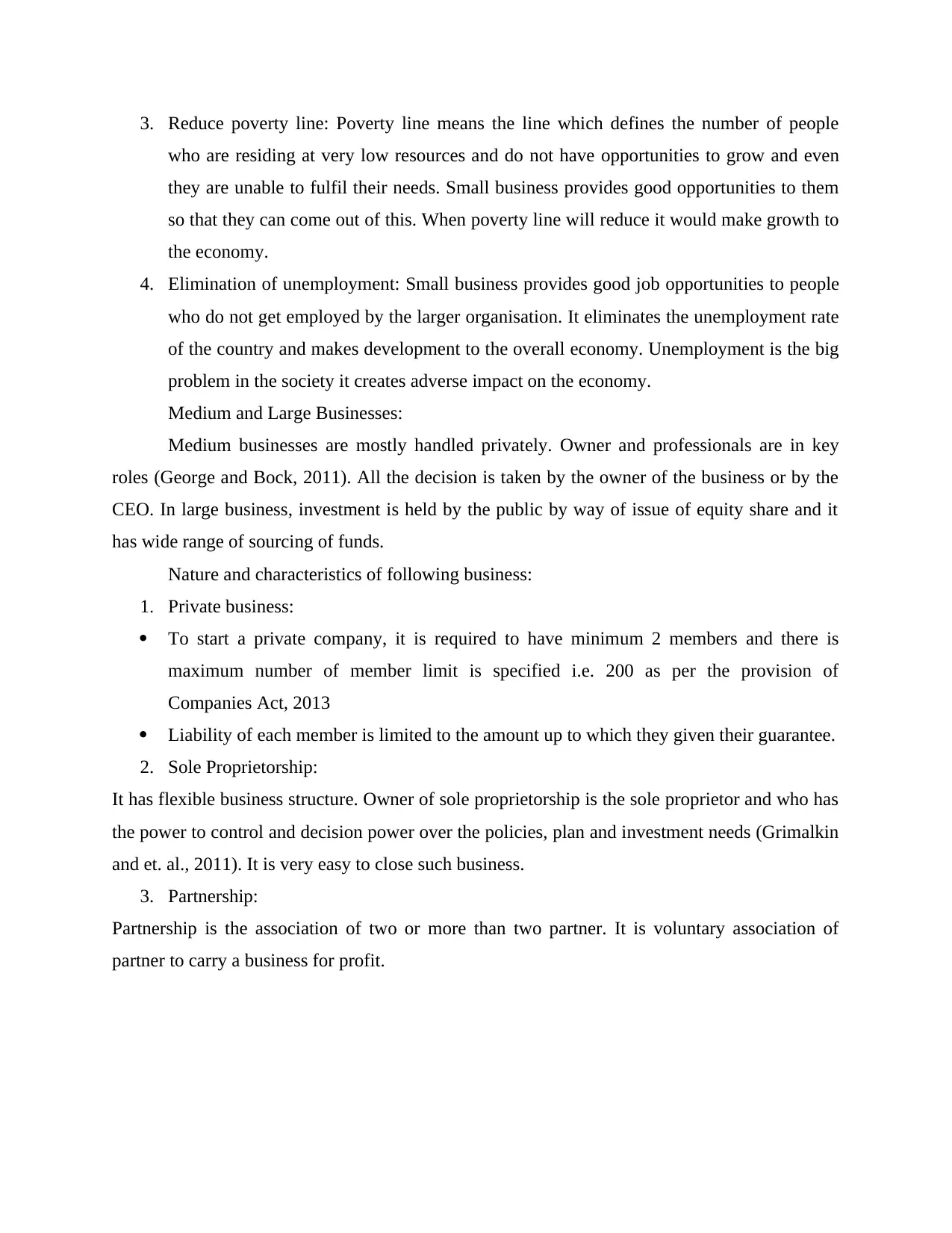
3. Reduce poverty line: Poverty line means the line which defines the number of people
who are residing at very low resources and do not have opportunities to grow and even
they are unable to fulfil their needs. Small business provides good opportunities to them
so that they can come out of this. When poverty line will reduce it would make growth to
the economy.
4. Elimination of unemployment: Small business provides good job opportunities to people
who do not get employed by the larger organisation. It eliminates the unemployment rate
of the country and makes development to the overall economy. Unemployment is the big
problem in the society it creates adverse impact on the economy.
Medium and Large Businesses:
Medium businesses are mostly handled privately. Owner and professionals are in key
roles (George and Bock, 2011). All the decision is taken by the owner of the business or by the
CEO. In large business, investment is held by the public by way of issue of equity share and it
has wide range of sourcing of funds.
Nature and characteristics of following business:
1. Private business:
To start a private company, it is required to have minimum 2 members and there is
maximum number of member limit is specified i.e. 200 as per the provision of
Companies Act, 2013
Liability of each member is limited to the amount up to which they given their guarantee.
2. Sole Proprietorship:
It has flexible business structure. Owner of sole proprietorship is the sole proprietor and who has
the power to control and decision power over the policies, plan and investment needs (Grimalkin
and et. al., 2011). It is very easy to close such business.
3. Partnership:
Partnership is the association of two or more than two partner. It is voluntary association of
partner to carry a business for profit.
who are residing at very low resources and do not have opportunities to grow and even
they are unable to fulfil their needs. Small business provides good opportunities to them
so that they can come out of this. When poverty line will reduce it would make growth to
the economy.
4. Elimination of unemployment: Small business provides good job opportunities to people
who do not get employed by the larger organisation. It eliminates the unemployment rate
of the country and makes development to the overall economy. Unemployment is the big
problem in the society it creates adverse impact on the economy.
Medium and Large Businesses:
Medium businesses are mostly handled privately. Owner and professionals are in key
roles (George and Bock, 2011). All the decision is taken by the owner of the business or by the
CEO. In large business, investment is held by the public by way of issue of equity share and it
has wide range of sourcing of funds.
Nature and characteristics of following business:
1. Private business:
To start a private company, it is required to have minimum 2 members and there is
maximum number of member limit is specified i.e. 200 as per the provision of
Companies Act, 2013
Liability of each member is limited to the amount up to which they given their guarantee.
2. Sole Proprietorship:
It has flexible business structure. Owner of sole proprietorship is the sole proprietor and who has
the power to control and decision power over the policies, plan and investment needs (Grimalkin
and et. al., 2011). It is very easy to close such business.
3. Partnership:
Partnership is the association of two or more than two partner. It is voluntary association of
partner to carry a business for profit.
⊘ This is a preview!⊘
Do you want full access?
Subscribe today to unlock all pages.

Trusted by 1+ million students worldwide
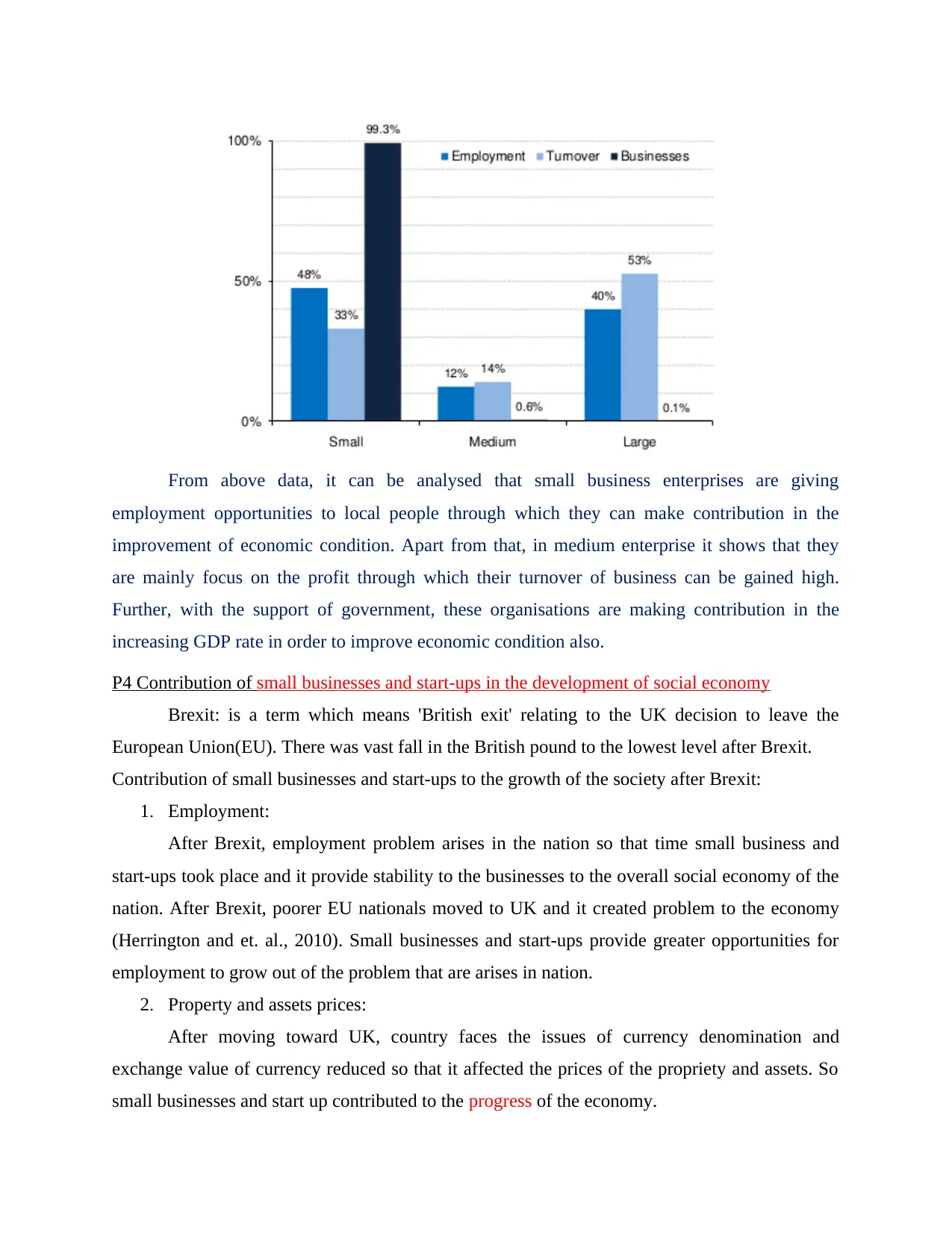
From above data, it can be analysed that small business enterprises are giving
employment opportunities to local people through which they can make contribution in the
improvement of economic condition. Apart from that, in medium enterprise it shows that they
are mainly focus on the profit through which their turnover of business can be gained high.
Further, with the support of government, these organisations are making contribution in the
increasing GDP rate in order to improve economic condition also.
P4 Contribution of small businesses and start-ups in the development of social economy
Brexit: is a term which means 'British exit' relating to the UK decision to leave the
European Union(EU). There was vast fall in the British pound to the lowest level after Brexit.
Contribution of small businesses and start-ups to the growth of the society after Brexit:
1. Employment:
After Brexit, employment problem arises in the nation so that time small business and
start-ups took place and it provide stability to the businesses to the overall social economy of the
nation. After Brexit, poorer EU nationals moved to UK and it created problem to the economy
(Herrington and et. al., 2010). Small businesses and start-ups provide greater opportunities for
employment to grow out of the problem that are arises in nation.
2. Property and assets prices:
After moving toward UK, country faces the issues of currency denomination and
exchange value of currency reduced so that it affected the prices of the propriety and assets. So
small businesses and start up contributed to the progress of the economy.
employment opportunities to local people through which they can make contribution in the
improvement of economic condition. Apart from that, in medium enterprise it shows that they
are mainly focus on the profit through which their turnover of business can be gained high.
Further, with the support of government, these organisations are making contribution in the
increasing GDP rate in order to improve economic condition also.
P4 Contribution of small businesses and start-ups in the development of social economy
Brexit: is a term which means 'British exit' relating to the UK decision to leave the
European Union(EU). There was vast fall in the British pound to the lowest level after Brexit.
Contribution of small businesses and start-ups to the growth of the society after Brexit:
1. Employment:
After Brexit, employment problem arises in the nation so that time small business and
start-ups took place and it provide stability to the businesses to the overall social economy of the
nation. After Brexit, poorer EU nationals moved to UK and it created problem to the economy
(Herrington and et. al., 2010). Small businesses and start-ups provide greater opportunities for
employment to grow out of the problem that are arises in nation.
2. Property and assets prices:
After moving toward UK, country faces the issues of currency denomination and
exchange value of currency reduced so that it affected the prices of the propriety and assets. So
small businesses and start up contributed to the progress of the economy.
Paraphrase This Document
Need a fresh take? Get an instant paraphrase of this document with our AI Paraphraser
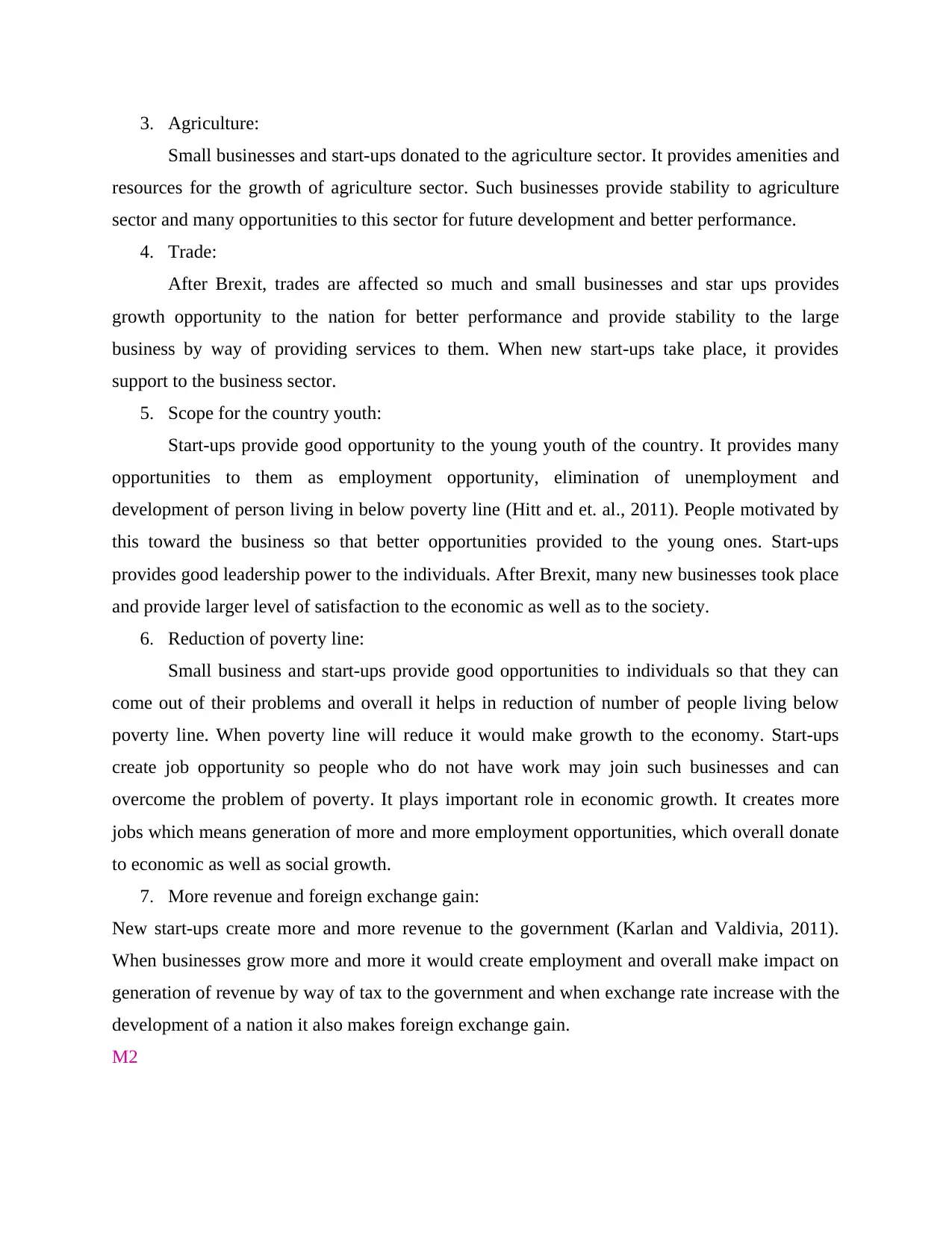
3. Agriculture:
Small businesses and start-ups donated to the agriculture sector. It provides amenities and
resources for the growth of agriculture sector. Such businesses provide stability to agriculture
sector and many opportunities to this sector for future development and better performance.
4. Trade:
After Brexit, trades are affected so much and small businesses and star ups provides
growth opportunity to the nation for better performance and provide stability to the large
business by way of providing services to them. When new start-ups take place, it provides
support to the business sector.
5. Scope for the country youth:
Start-ups provide good opportunity to the young youth of the country. It provides many
opportunities to them as employment opportunity, elimination of unemployment and
development of person living in below poverty line (Hitt and et. al., 2011). People motivated by
this toward the business so that better opportunities provided to the young ones. Start-ups
provides good leadership power to the individuals. After Brexit, many new businesses took place
and provide larger level of satisfaction to the economic as well as to the society.
6. Reduction of poverty line:
Small business and start-ups provide good opportunities to individuals so that they can
come out of their problems and overall it helps in reduction of number of people living below
poverty line. When poverty line will reduce it would make growth to the economy. Start-ups
create job opportunity so people who do not have work may join such businesses and can
overcome the problem of poverty. It plays important role in economic growth. It creates more
jobs which means generation of more and more employment opportunities, which overall donate
to economic as well as social growth.
7. More revenue and foreign exchange gain:
New start-ups create more and more revenue to the government (Karlan and Valdivia, 2011).
When businesses grow more and more it would create employment and overall make impact on
generation of revenue by way of tax to the government and when exchange rate increase with the
development of a nation it also makes foreign exchange gain.
M2
Small businesses and start-ups donated to the agriculture sector. It provides amenities and
resources for the growth of agriculture sector. Such businesses provide stability to agriculture
sector and many opportunities to this sector for future development and better performance.
4. Trade:
After Brexit, trades are affected so much and small businesses and star ups provides
growth opportunity to the nation for better performance and provide stability to the large
business by way of providing services to them. When new start-ups take place, it provides
support to the business sector.
5. Scope for the country youth:
Start-ups provide good opportunity to the young youth of the country. It provides many
opportunities to them as employment opportunity, elimination of unemployment and
development of person living in below poverty line (Hitt and et. al., 2011). People motivated by
this toward the business so that better opportunities provided to the young ones. Start-ups
provides good leadership power to the individuals. After Brexit, many new businesses took place
and provide larger level of satisfaction to the economic as well as to the society.
6. Reduction of poverty line:
Small business and start-ups provide good opportunities to individuals so that they can
come out of their problems and overall it helps in reduction of number of people living below
poverty line. When poverty line will reduce it would make growth to the economy. Start-ups
create job opportunity so people who do not have work may join such businesses and can
overcome the problem of poverty. It plays important role in economic growth. It creates more
jobs which means generation of more and more employment opportunities, which overall donate
to economic as well as social growth.
7. More revenue and foreign exchange gain:
New start-ups create more and more revenue to the government (Karlan and Valdivia, 2011).
When businesses grow more and more it would create employment and overall make impact on
generation of revenue by way of tax to the government and when exchange rate increase with the
development of a nation it also makes foreign exchange gain.
M2
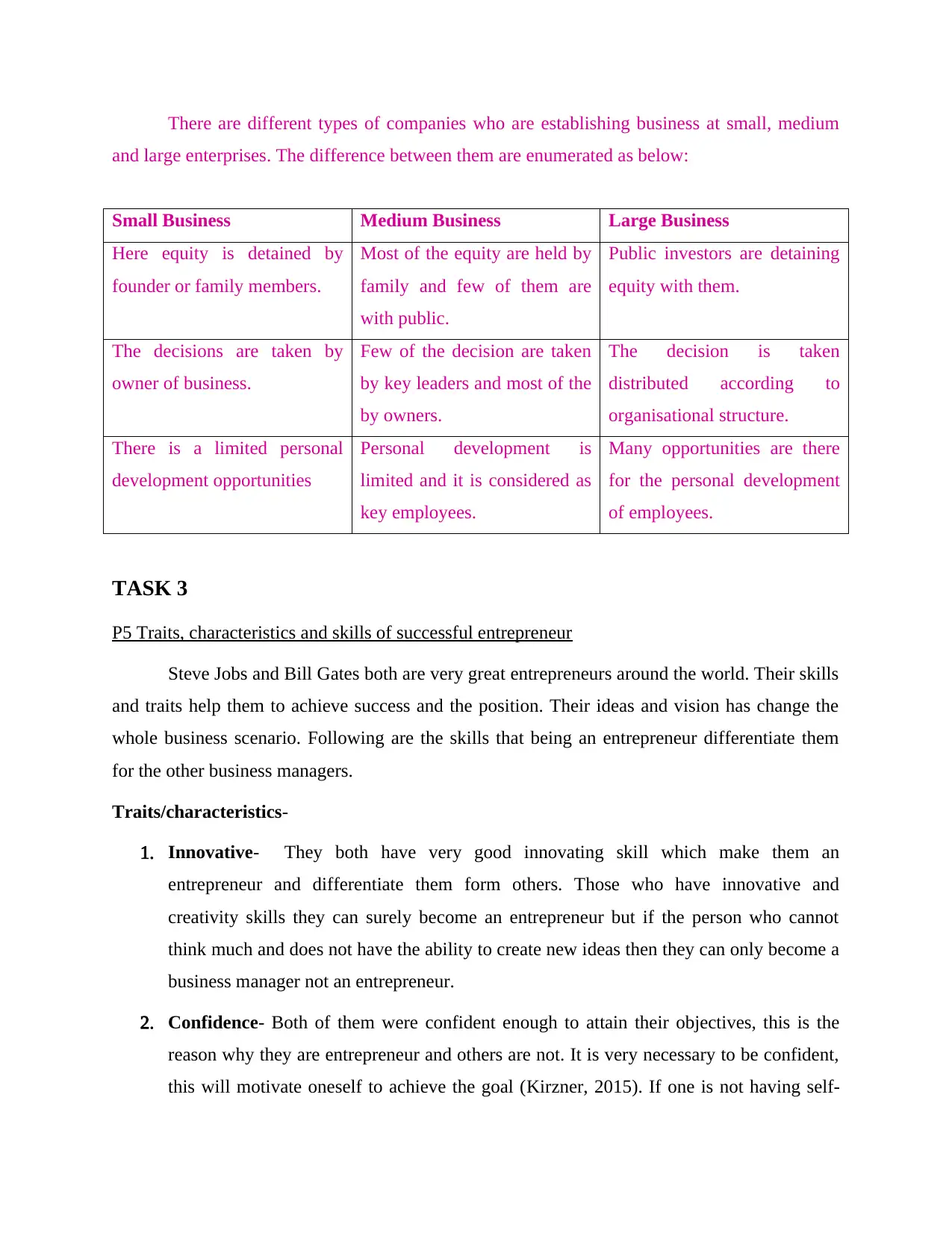
There are different types of companies who are establishing business at small, medium
and large enterprises. The difference between them are enumerated as below:
Small Business Medium Business Large Business
Here equity is detained by
founder or family members.
Most of the equity are held by
family and few of them are
with public.
Public investors are detaining
equity with them.
The decisions are taken by
owner of business.
Few of the decision are taken
by key leaders and most of the
by owners.
The decision is taken
distributed according to
organisational structure.
There is a limited personal
development opportunities
Personal development is
limited and it is considered as
key employees.
Many opportunities are there
for the personal development
of employees.
TASK 3
P5 Traits, characteristics and skills of successful entrepreneur
Steve Jobs and Bill Gates both are very great entrepreneurs around the world. Their skills
and traits help them to achieve success and the position. Their ideas and vision has change the
whole business scenario. Following are the skills that being an entrepreneur differentiate them
for the other business managers.
Traits/characteristics-
1. Innovative- They both have very good innovating skill which make them an
entrepreneur and differentiate them form others. Those who have innovative and
creativity skills they can surely become an entrepreneur but if the person who cannot
think much and does not have the ability to create new ideas then they can only become a
business manager not an entrepreneur.
2. Confidence- Both of them were confident enough to attain their objectives, this is the
reason why they are entrepreneur and others are not. It is very necessary to be confident,
this will motivate oneself to achieve the goal (Kirzner, 2015). If one is not having self-
and large enterprises. The difference between them are enumerated as below:
Small Business Medium Business Large Business
Here equity is detained by
founder or family members.
Most of the equity are held by
family and few of them are
with public.
Public investors are detaining
equity with them.
The decisions are taken by
owner of business.
Few of the decision are taken
by key leaders and most of the
by owners.
The decision is taken
distributed according to
organisational structure.
There is a limited personal
development opportunities
Personal development is
limited and it is considered as
key employees.
Many opportunities are there
for the personal development
of employees.
TASK 3
P5 Traits, characteristics and skills of successful entrepreneur
Steve Jobs and Bill Gates both are very great entrepreneurs around the world. Their skills
and traits help them to achieve success and the position. Their ideas and vision has change the
whole business scenario. Following are the skills that being an entrepreneur differentiate them
for the other business managers.
Traits/characteristics-
1. Innovative- They both have very good innovating skill which make them an
entrepreneur and differentiate them form others. Those who have innovative and
creativity skills they can surely become an entrepreneur but if the person who cannot
think much and does not have the ability to create new ideas then they can only become a
business manager not an entrepreneur.
2. Confidence- Both of them were confident enough to attain their objectives, this is the
reason why they are entrepreneur and others are not. It is very necessary to be confident,
this will motivate oneself to achieve the goal (Kirzner, 2015). If one is not having self-
⊘ This is a preview!⊘
Do you want full access?
Subscribe today to unlock all pages.

Trusted by 1+ million students worldwide
1 out of 18
Related Documents
Your All-in-One AI-Powered Toolkit for Academic Success.
+13062052269
info@desklib.com
Available 24*7 on WhatsApp / Email
![[object Object]](/_next/static/media/star-bottom.7253800d.svg)
Unlock your academic potential
Copyright © 2020–2026 A2Z Services. All Rights Reserved. Developed and managed by ZUCOL.





